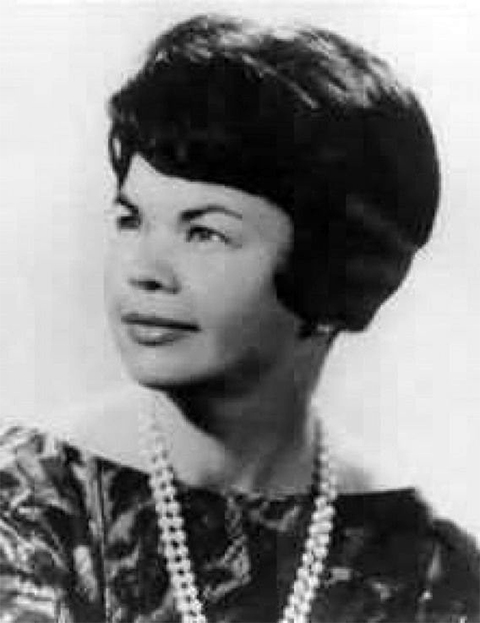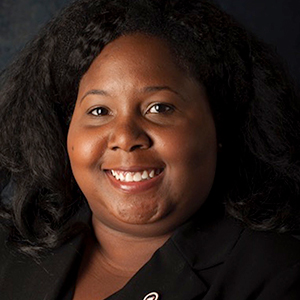The legacy of Geraldine P. Woods
For Black History Month, I want to highlight a remarkable scientist whose actions led to the development of two of the most successful diversity training programs at the National Institutes of Health, NIH: Geraldine Pittman Woods.
I was one of the thousands of students who have benefited from these programs.

In 1964, Woods became the first African American woman appointed to the National Advisory General Medical Sciences Council at the NIH. In this position, she improved science education and research opportunities at historically Black colleges and universities by establishing two programs: Maximizing Access to Research Careers and Research Initiative for Scientific Enhancement, both components of Minority Biomedical Research Support at the NIH.
In the more than four decades since their founding, these programs have diversified the biomedical science, technology, education and mathematics workforce by supporting academic, research and professional development activities for undergraduate students from underrepresented groups.
Ruth Kirschstein, former acting NIH director and director of the National Institute of General Medical Sciences, called Woods “a person ahead of her time.”
"She received a Ph.D. in biology from Radcliffe long before any other African American scientist could so qualify,” Kirschstein said. “Yet, she never forgot her roots and worked tirelessly to assist in establishing the MARC and MBRS programs.”
The program facilitator
Born in Florida in 1921, Woods began her journey in higher education at Talladega College and transferred to Howard University where she earned her bachelor’s degree. Seeing her aptitude for science, her professors at Howard urged her to continue her education in graduate school. She earned both a master’s degree and a Ph.D. in neuro-embryology from Radcliffe College, now Harvard University, in 1945.
After her time at Radcliffe, Woods was briefly an instructor at Howard before she and her husband moved to California, where she raised her family. When her children were teenagers, she volunteered for social services, equality of opportunity, and civil rights efforts in Los Angeles and later served in the California Department of Employment where her work caught the attention of President Lyndon B. Johnson’s wife, Lady Bird Johnson, who invited Woods to help launch the Head Start program for preschool-age children.
In 1969, Woods was appointed to the NAGMSC at NIH as a special consultant advising the council’s director and staff on ways to improve and increase biomedical science research and training at HBCUs.
“I noticed that, NIH and NIGMS, receive thousands and thousands of grant applications, but so few of them were from Black colleges,” Woods said in the book “Black Women Scientists in the United States.” “And of those few that did come from Black colleges, even fewer were awarded funding.”
Woods contributed to the founding of the MARC and RISE programs in 1977, working with a group of colleges and universities toward the goal of developing a strong undergraduate curriculum and gathering undergraduate interest in the biomedical sciences. By the end of the first year, 120 students had matriculated in undergraduate research through both programs and in 1981, the MARC program opened awards to doctoral trainees.
As a scientist–activist, Woods worked with lawmakers to improve research facilities and science curriculums at historically Black colleges and universities, and she conducted outreach to minority-serving institutions, or MSIs, through seminars and tutorials to assist with preparing federal grant applications. By serving as a liaison between MSIs and the NIH, Wood helped improve the approval rate for funding to these institutions.
About the programs
Woods died in December 1999. The programs she worked to create live on.
Since 1977, over 9,000 trainees have participated in the MARC program, with over half ultimately pursuing doctoral degrees and scientific careers. The RISE program has expanded to serve undergraduate, master’s and doctoral students: the Undergraduate Research Training Initiative for Student Enhancement, or U-RISE; the Bridges to the Doctorate Student Training Program; and the Graduate Research Training Initiative for Student Enhancement, or G-RISE, programs. Both programs have provided mentorship, stipends, and opportunities to present at research conferences for underrepresented trainees.
Through institutional awards, the MARC and RISE programs have reached dozens of colleges and universities, supporting academic, research and professional development activities for underrepresented undergraduate and doctoral students in the biomedical sciences.
“Many people just call me a scientist,” Woods said, “and I’ve been named one of the famous Black scientists, but I don’t consider myself a true scientist, just a facilitator, a science-trained academic who has worked to make science available for others by developing a program to provide better access for those who, historically, have been bypassed.”
Personal impact
As a former RISE scholar myself, I feel honored to write about Woods and her many accomplishments.
Through RISE, I was able to get the vital research experience and professional development needed for graduate school that I would have not been afforded otherwise. The program provided mentors who saw unlimited potential in me and nurtured my love of science. Through RISE, I was able to attend my first scientific conference, learn effective networking strategies and explore a variety of research fields. Without the exposure to research so early on as an undergraduate, I never would have thought pursuing a career in science was possible.
ASBMB supports diversity training programs
The American Society for Biochemistry and Molecular Biology public affairs team has advocated for increased funding for the Maximizing Access to Research Careers and Research Initiative for Scientific Enhancement programs.
In February 2022, the society recommended that the National Institute of General Medical Sciences expand the programs, which fund college sophomores through seniors, to also support first-year students.
In May, the society submitted written testimony to the House Appropriations Subcommittee on Labor, Health and Human Services, and Education in support of NIGMS funding dedicated to training and capacity-building programs that attract talent from underrepresented populations in science, technology, engineering and mathematics.
The society also contributed to a “Dear Colleague” letter sponsored by U.S. Sen. Ben Ray Luján, D-N.M. That letter specifically noted that the MARC program, and others like it, “implement effective, evidence-informed approaches to biomedical training and mentoring that will keep pace with the rapid evolution of the research enterprise.”
In addition, when 26 ASBMB members attended the society’s annual Hill Day and held 59 meetings with their lawmakers and legislative staffers, they advocated for appropriators to increase funding at NIGMS and other agencies with impactful STEM training programs.
With appropriation season coming up, the public affairs team plans to continue to make the case for increasing funding for these programs.
Enjoy reading ASBMB Today?
Become a member to receive the print edition four times a year and the digital edition monthly.
Learn moreGet the latest from ASBMB Today
Enter your email address, and we’ll send you a weekly email with recent articles, interviews and more.
Latest in People
People highlights or most popular articles

Simcox wins SACNAS mentorship award
She was recognized for her sustained excellence in mentorship and was honored at SACNAS’ 2025 National Conference.

From humble beginnings to unlocking lysosomal secrets
Monther Abu–Remaileh will receive the ASBMB’s 2026 Walter A. Shaw Young Investigator Award in Lipid Research at the ASBMB Annual Meeting, March 7-10 in Washington, D.C.

Chemistry meets biology to thwart parasites
Margaret Phillips will receive the Alice and C. C. Wang Award in Molecular Parasitology at the ASBMB Annual Meeting, March 7-10 in Washington, D.C.

ASBMB announces 2026 JBC/Tabor awardees
The seven awardees are first authors of outstanding papers published in 2025 in the Journal of Biological Chemistry.

Decoding how bacteria flip host’s molecular switches
Kim Orth will receive the Earl and Thressa Stadtman Distinguished Scientists Award at the ASBMB Annual Meeting, March 7–10, just outside of Washington, D.C.

Thiam elected to EMBO
He was recognized during the EMBO Members’ Meeting in Heidelberg, Germany, in October.

